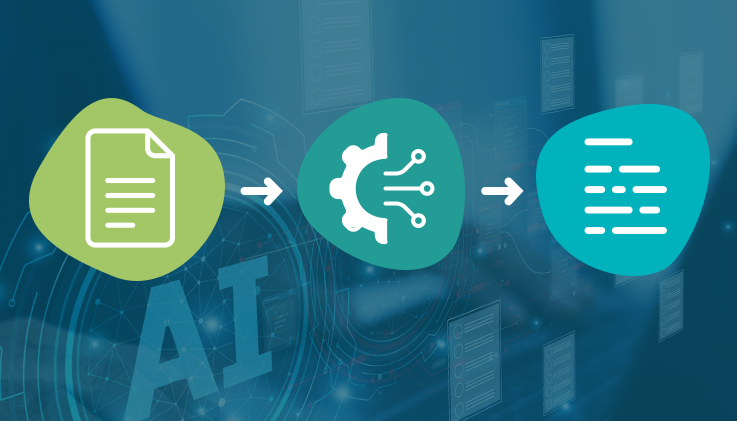Customers do not wait anymore. If your shipment moves, they want to know. If there is a hiccup, they want it fixed. This puts pressure on logistics companies, leading to high service demands and rising costs. AI-powered solutions offer a clear path to achieving both efficiency and transparency in complex customer support scenarios.
Reasons why AI agents are key to redefine logistics CX
- Handles massive and identical tickets at scale, freeing up human agents. Reduced average handling time.
- Unifies fragmented tracking, inventory, and billing data into one seamless, comprehensive view. Instant, 360-degree context.
- AI processes complex documents and extracts important data. Manual document friction eliminated.
- Intelligent quote generation integrated into brokerage workflows to minimize pricing errors and risk. Accelerated conversation.
In this blog, we focus on how logistics companies can get started with strategic deployment of AI agents and transform their customer service processes.
Typical customer service challenges in logistics
Logistics customer support teams are constantly battling a high volume of supply chain queries related to shipment status, delivery issues, billing issues, etc. We have listed the challenges faced by support teams when they do not have real-time visibility of customer information.
- High demand for shipping status/tracking information – similar inquiries from multiple customers.
- Appointment changes and rerouting – customers want to spontaneously change delivery addresses or time slots.
- Damage reports and complaints – managing complaints in the event of loss, damage, or incorrect delivery.
- Returns processing – manual and disparate processes related to collection, return labels, and credit notes.
- Customs and document issues – good related to international shipments.
- Address and payment data corrections – correcting incorrect information or changing payment methods.
How AI agents and AI assistants redefine CX excellence in logistics
An AI-powered customer service platform specifically addresses these challenges and enables logistics companies to sustainably improve their service levels. Fast and transparent communication helps companies gain the trust of their customers. On the contrary, a lack of transparency and slow response times often lead to customers feeling frustrated or dissatisfied.
And so, quick, contextual support is the definitive competitive differentiator. Studies show that an outstanding customer experience not only increases customer satisfaction but also strengthens brand loyalty. This makes customer service a strategically decisive competitive factor in the logistics industry.
Digital excellence with AI-supported self-services for logistics providers: AI-based chatbots and virtual assistants answer routine queries around the clock, contextually and reliably. This minimizes waiting times, effectively relieves the workload of service employees, and resolves customer concerns immediately.
Omnichannel communication, thanks to AI: AI platforms unify multiple channels and store customer data in a centralized system. Customers no longer have to repeat their issues after switching channels, making the service consistent and seamless.
Greater personalization in logistics services: With AI-powered analytics, logistics providers can identify specific supply chain issues and serve their customers with tailored services and offers instead of generic communication.
Humans and machines complement each other effectively: Routine tasks are efficiently automated by AI, allowing support agents to focus more on complex and creative problem-solving issues. The result is a balanced mix that combines operational efficiency with a personalized customer experience.
Trust through security and transparency: Modern AI solutions process data in accordance with global data privacy requirements, offer the highest security standards, and can be deployed transparently.
Read more: Efficient Support Processes In Logistics And Supply Chain Management
7 use cases of AI agents in logistics
Advanced AI combined with intelligent case processing provides ease in logistics customer service. The below listed processes can be streamlined with the right customer service solution.
- Shipment tracking & ETA updates: Customers often ask, "Where is my shipment?" AI agents can automatically retrieve shipment status information, predict the estimated time of arrival (ETA), and proactively inform customers.
- Appointment changes & rerouting: AI agents allow customers to change delivery windows, redirect delivery locations, or have deliveries made to neighbors directly.
- Damage & loss reporting: Customers can report damage digitally (e.g., by uploading a photo); the AI agent checks for completeness, categorizes the case, and escalates it to relevant departments.
- Automate the returns process: The AI agent can manage book returns, generate labels, coordinate pickup times, and process refunds independently.
- Customs & export documentation: For cross-border shipments, the AI agent reads commercial invoices, checks CMR/customs data, and automatically validates documents.
- Payment & address data correction: The AI agent recognizes requests to change payment or address data, verifies authentication, and securely forwards changes.
- Customer satisfaction assessment (CSAT): After a delivery or interaction, the AI agent automatically sends surveys and evaluates customer sentiment to measure service quality in real-time.
How ThinkOwl unifies logistics workflows and agent guidance
To realize the full potential of AI in logistics customer service, companies need a platform that intelligently connects all communication channels and automates processes. This is precisely where ThinkOwl — a cloud-based AI powered — comes in to deliver innovative and efficient customer communication.
ThinkOwl combines contact center as a service (CCaaS) with AI-based case management and powerful self-service modules. The platform enables efficient request processing, automates workflows, and relieves the burden on customer support teams.
With AI Assist, ThinkOwl offers employees real-time support such as automatic text suggestions, intelligent next-best-action recommendations, and quick knowledge base access. AI agents based on conversational AI autonomously handle recurring inquiries received from phone, chat, email, or app, offering an immediate and consistent support experience across channels.
With ThinkOwl, logistics companies get a platform that combines automation, transparency, and human touch exactly where it is needed. Take a closer look at how ThinkOwl supercharges support teams’ productivity.
- AI assist for employees: Real-time suggestions, templates, and background information so employees can respond more quickly and reliably.
- AI agents/conversational AI: Automation of standard processes across all channels including email, phone, chat, social media, and custom channels.
- Omnichannel & cross-channel integration: Customer communication becomes channel-neutral, context is preserved, and switching between channels is seamless.
- Seamless connection to TMS / WMS / ERP: ThinkOwl connects seamlessly to core logistics systems to directly exchange real-time data and process transactions.
- Scalability & flexibility: Thousands of inquiries can be processed in parallel, eliminating bottlenecks, especially during peak times.
- Security & infrastructure compliance: Hosting in certified data centers, compliance with global data privacy laws included.
Read more: Ship Your Goods On Time, Every Time
AI roadmap for logistics leaders
Logistics companies are increasingly looking to adopt AI, but there are certain important points that they need to consider to get the most out of their AI investment.
- Data quality & interfaces: Without clean inventory data (e.g., shipment status, customer profiles), AI becomes error prone.
- AI model orchestration: Different channels often require different models and parameters; a smart platform can orchestrate this automatically.
- Pilot phases & use case focus: Start with a clearly defined case (e.g., shipment status) and scale from there.
- Change management & employee engagement: Employees must clearly understand the role of an AI agent and learn to work with it.
- Transparency & quality assurance: Decisions taken by AI must be transparent; monitoring, feedback loops, and evaluation are essential.
- Data protection & compliance: Data protection and regulatory requirements must be adhered to, especially for international shipments.
Frequently Asked Questions
- What is customer support in logistics?
In the logistics industry, a seamless connection between distributors, manufacturers, retailers, and wholesalers is essential for a streamlined supply chain ecosystem. Logistics support teams that use a customer service platform get a unified view of the queries received from these partners regarding shipment status and tracking, scheduling and delivery changes, returns and inventory, and compliance paperwork.
2. How is artificial intelligence used in logistics?
Artificial intelligence (AI) in logistics plays a crucial role in implementing unified intelligence across the entire supply chain journey. AI provides logistics companies with prediction capabilities related to demand forecasting and optimizes inventory and minimizes overstocking. AI also automates tasks like customer interactions, empowering customers to independently manage their orders without human intervention.
3. What is the use of AI agent in supply chain?
AI agents play a key role in automating end-to-end supply chain processes, handling high-volume, repetitive tasks across multiple channels, including client communications and business transactions. They can integrate with inventory and warehouse management systems to access relevant customer data and process requests autonomously, without human intervention. Working alongside robotic process automation (RPA) tools, AI agents mimic human actions to streamline the flow of goods and information, enhancing efficiency and reducing operational friction.
Conclusion
In logistics, speed and transparency are everything. AI agents are helping support teams deliver exactly that. Businesses that embrace AI-powered customer service not only streamline workflows but also position themselves as forward-thinking, reliable partners. ThinkOwl’s AI agents make this possible through:
- End-to-end process automation
- AI-driven quotation generation
- Intelligent document capture and data extraction
- Integration with any TMS or ERP system
- Innovative approaches in logistics customer support that enhance engagement
Experience how ThinkOwl’s AI agents can transform your logistics operations and redefine CX!












